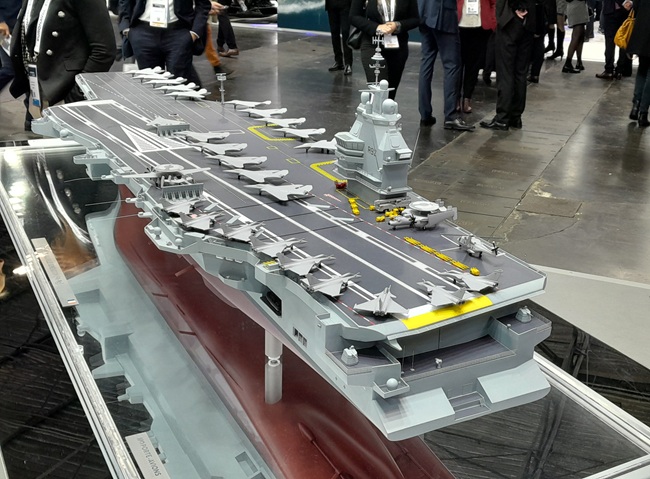
In France, a report drafted in early June 2025 by 2 members of the French National Assembly analyzes various military procurement programs included in the Loi de Programmation Militaire (Military Programming Law) currently in force (LPM 2024-2030), and is rising concerns about the future French aircraft carrier PA-NG (Porte Avion-Nouvelle Génération).
Specifically, the report ‘Mass and high technology: what balance for French military equipment?’, assesses the current procurement cycle in light of the need to increase the critical mass of the French military.
Among other things, the report proposes delaying the construction of the future French aircraft carrier, better known as PA-NG, which is scheduled to begin by the end of the year (the design phase is almost complete). According to the 2 parliamentarians, while not disputing the need for a new aircraft carrier to replace the CHARLES DE GAULLE (scheduled for retirement in 2038), postponing the construction of the PA-NG would free up to €1 billion per year (more likely 500 millions) to finance other capabilities deemed to be priorities, such as the construction of 3 new multi-mission frigates.
The proposal provoked an outcry from the Chief of Staff of the French Navy, Admiral Nicolas Vaujour, as well as the Minister of Defence, Sébastien Lecornu. In a parliamentary hearing held shortly after the report's publication, Admiral Vaujour insisted on the importance of the PA-NG, and of aircraft carriers in general, as a tool of warfare and naval diplomacy, stating that the construction of the future aircraft carrier is a tool of exceptional technological and industrial growth for the whole of France and as such must be preserved, not least because of its socio-economic impact.
Although he had called for the construction of additional multi-mission frigates last February, Minister Lecornu was much more direct, firmly opposing the 2 parliamentarians' proposal for several reasons, primarily the importance of aircraft carriers in future conflicts, not only to ensure air superiority at sea, but also to project air power onto land, a concept that cannot is key to France's power projection capabilities.
According to Lecornu, the construction of the PA-NG is also absolutely necessary in order not to lose high-profile industrial and manufacturing capabilities, such as those related to the construction of the 2 nuclear reactors planned for the new aircraft carrier. Lecornu pointed out that in addition to these, there are 4 reactors on nuclear ballistic missile submarines in service, as well as those to be built in the future, and 7 on board the 6 SUFFREN-class nuclear attack submarines in service and under construction, and that this is the minimum necessary to maintain the aforementioned capabilities.
Finally, Lecornu focused on the issue of personnel, reiterating that the training of a crew of 1,400 highly specialized military personnel cannot be suspended for 4 or 5 years and then restarted from scratch, because this would risk losing important professional skills.
To Lecornu's considerations can also be added the fact that in 2038, the year in which the PA-NG is expected to enter service, the CHARLES DE GAULLE will have 37 years of service under its belt, which is certainly not insignificant in light of the aircraft carrier's past, present, and future operational commitments.
In essence, the PANG issue continues to cause a stir in France: as the most important military program, the financial costs and everything associated with it remain the subject of lively debate in public opinion and the political sphere, so much so that only a political decision at the highest level can ensure its continuity.








